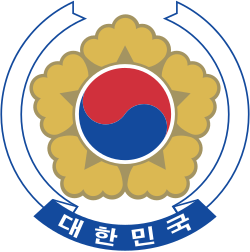| This article is part of a series on |
 |
|---|
This article lists political parties in South Korea.
Contents
- Current parties
- Parties represented in the National Assembly
- Extra-parliamentary parties
- Parties in formation
- Defunct parties
- Conservative parties 2
- Liberal parties 2
- Progressive parties 2
- Green parties
- Unknown or syncretic parties
- Banned political movements
- See also
- Notes
- References
- Bibliography
South Korea has a weakly institutionalized multi-party system, [1] [2] characterized by frequent changes in party arrangements. It has sometimes been described as having characteristics of a two-party system. [3] At least one of the many political parties has a chance of gaining power alone.
